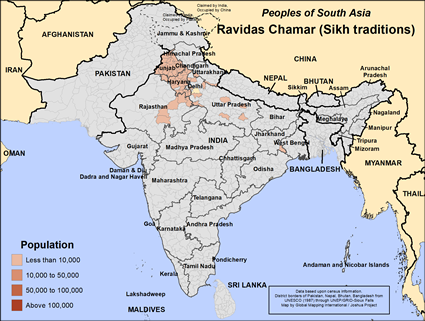Ravidas Chamar (Sikh traditions) in India

Send Joshua Project a photo
of this people group. |

Map Source:
People Group data: Omid. Map geography: UNESCO / GMI. Map Design: Joshua Project
|
| People Name: | Ravidas Chamar (Sikh traditions) |
| Country: | India |
| 10/40 Window: | Yes |
| Population: | 23,000 |
| World Population: | 23,000 |
| Primary Language: | Punjabi, Eastern |
| Primary Religion: | Other / Small |
| Christian Adherents: | 0.00 % |
| Evangelicals: | 0.00 % |
| Scripture: | Complete Bible |
| Ministry Resources: | Yes |
| Jesus Film: | Yes |
| Audio Recordings: | Yes |
| People Cluster: | South Asia Dalit - Chamar (Bhambi) |
| Affinity Bloc: | South Asian Peoples |
| Progress Level: |
|
Introduction / History
The Ravidas are part of a subgroup of Chamar. Chamars represent the largest population of low caste communities in India. Their traditional occupation is that of leather worker. Within the Ravidas subgroup, most are Hindu. There is a small Sikh population among them. Most of the Sikh Ravidas Chamar live in Punjab, Haryana. Smaller numbers are in other northern states.
What Are Their Lives Like?
The Ravidas make shoes, belts and other goods from leather. Some Sikh Ravidas have left their former occupation to weave bamboo into baskets and other useful items. Still others work as landless laborers on tea plantations and farms.
Unfortunately, illiteracy is an issue for the Sikh Ravidas. Without a proper education, they have little opportunity to escape their lives of poverty and exclusion.
What Are Their Beliefs?
Sikhism originated from a 15th century teacher named Guru Nanak Dev as a reform movement. He rejected the Hindu caste system, taught that all people were equal and that all have equal access to God. The Sikh God is formless, without gender and is to be found in everyone. One gets closer to God by living a good life and by practicing charity. Like Hindus, Sikhs believe in reincarnation and the law of karma; you reap what you sow in your previous life. Like Muslims, the Sikhs worship only one God.
One may recognize a Sikh man by his distinctive turban. All the 10 great Sikh gurus wore turbans. Sikh teaching mandates that a person not cut his or her hair. They worship their holy book, the Granth Sahib, which is a collection of hymns.
There are roughly the same number of Sikhs as there are Jews in the world, but Sikhs are most concentrated in Punjab, their homeland. However, you will find smaller numbers of Sikhs all over the world. Many of the best Indian restaurants in the West are owned and operated by Sikhs.
What Are Their Needs?
The lives of the Ravidas Chamar, like the lives of all low caste communities, are challenging. They are excluded from many aspects of Indian life by their low classification. The Indian constitution outlaws the caste system, but it still ingrained in the hearts of the Hindus. Most Ravidas live in rural villages without the modern blessings of clean water, electricity and indoor plumbing.
The Ravidas marry within their caste. Their own priests lead important life ceremonies since Brahmins will not work with them. Families arrange marriages. Sons inherit property with most going to the eldest son. The newly married Ravidas couple lives with or near the groom's parents.
The main foods of the Ravidas Chamar are rice, sorghum and seasonable vegetables and fruit. The Ravidas are not vegetarians but as Hindus they will not eat beef.
Prayer Points
The Ravidas Chamar practice Hinduism, the ancient religion of India. They worship and serve the gods of the Hindu pantheon. Their main gods are Vishnu, the preserver and Shiva, the destroyer. Hindus believe that by performing rituals and good works that they will attain moksha or freedom from the endless cycle of birth, death and rebirth. The Ravidas offer prayers, food, flowers and incense to their gods at their village shrines because as memebers from a lower class, they are often not allowed to enter standard Hindu temples.
The main yearly holidays of the Ravidas people are Holi, the festival of colors, Diwali, the festival of lights and Navratri, the celebration of autumn.